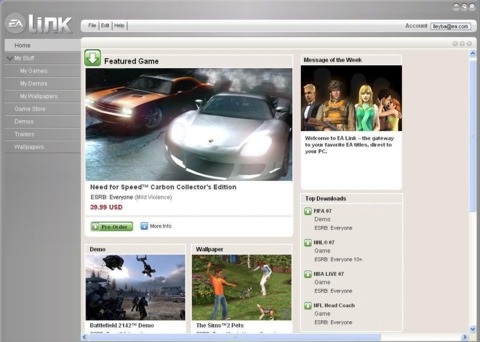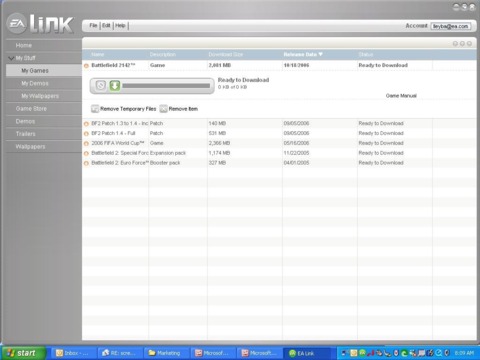Q&A: Linking up with customers, EA style
EA overhauls Downloader, renames it EA Link; digital distribution service will be used to deliver PC games and extras to customers--all over the Internet.
Electronic Arts is preparing itself for a revolution. In the future, most predict that selling games to customers will be done entirely over the Internet--shopping, paying, and distributing will all be done online.
EA dipped into digital distribution with EA Downloader in late 2005, and while it hasn't enjoyed the same success as the industry's staple--Valve's Steam--it did plant the publisher in the fledgling realm.
Downloader has been given a complete overhaul and a new moniker, EA Link. Though the service was launched earlier this week, EA formally announced it today.
While the concept is the same, EA Link will streamline purchasing and serve as a hub for game content, such as demos, trailers, wallpapers, and other files. Purchasing will also be made from within the application via PayPal and Click&Buy, virtually eliminating the need for a Web browser when buying games from the publisher.
Among the games now purchasable from EA Link are Tiger Woods PGA Tour 07, NHL 07, Battlefield 2142. For future titles, EA will use EA Link to give gamers exclusive extras when they preorder games.
GameSpot talked with Chip Lange, EA's vice president of online commerce, about the new endeavor.
GameSpot: Is EA Link strictly a retail and distribution channel?
Chip Lange: No, it's really designed to be an all-purpose link to our PC customer base to serve everything from distribution of product to keeping software current, to messaging key community activities, to allowing people to experiment and try other types of products through demos, trailers, that type of thing. A lot of our customers on the Xbox [360] have been enjoying customizing their systems with pics and gamer themes. We'll do similar things on the PC here. So it's meant to be kind of an all-access content pipeline for our customers, and it's meant to be done in such a way that it's user friendly, convenient, and easy to use.
GS: Can you go into more of the community aspects of the site?
CL: The community aspects are in development, but the tool is designed for us to be able to push an enormous amount of content, different types of content. Like I mentioned, themes, demos, trailers, those type of things. And then on a community side, this will become the content pipeline that will partner with our retooled community Web sites. If you go to EAsports.com you'll get a really good snapshot of some of the features and functionality that are being demonstrated with that. So those two tools work hand-in-hand to provide what we think is a state-of-the art world-class community and content service for our customers. It goes both ways--us to customers and customers back to us. And then probably most importantly, customer to customer.
GS: What are you going to learn from your customers through this?
CL: I think what this showcases is that we're listening and learning on what they're expecting in terms of content and user experience. So we've heard a lot of feedback on the EA Downloader. I don't know if you've used that, but we've been paying real close attention to the different message boards. The Battlefield customer for example, is a very vocal customer base. And they've had some real specific feedback on how the Downloader functions and how the user experience works. One of the biggest things that we heard about was in-application purchasing.
Last night on the Downloader, if you were going to buy a copy of Battlefield, you needed to leave the application and go to the Web and buy it that way. It was a clunky experience to say the least. One of the things that people expect is to be able to open their Downloader if they see some content they want to buy, you click "Buy It Now," and it just happens. So that was a feature.
Another feature we listened and learned from was PayPal, that it's one of the primary purchase options on the Internet, and our customers were screaming for it. So we built that right into the purchase page of the application itself. One of the things that we are working on, that we've heard loud and clear, is there's a demand for some of our catalogue titles. They're a little hard to find at certain retailers, so we're working right now on backdating some of our content so that we can keep that rolling through the system as well.
GS: Valve distributes other publishers' games on Steam. Is that something that would be an option for EA?
CL: We don't have anything to announce today. My take on this has been I want to get to an experience that I feel personally confident in delivering the world-class content and purchasing pipeline for our customer base before we explore any other options. I'm not ruling anything out but I wanted to walk before we ran. [We want to get] to an experience that customers are happy with, where the feedback is, "Great job, here's a couple of things that we would love to see added to this," as opposed to, "I'm really struggling with how to use this."
GS: So you're going to be the guinea pig for a while.
CL: EA is going to be working through the system to make sure it works, yes.
GS: EA owns distribution rights to upcoming games in Valve's Half-Life series. Are future Half-Life games going to be on EA Link, and does Valve have a problem with that prospect?
CL: I don't know how this connects with our Valve agreement. So I have to defer that question.
GS: Digital distribution appears to be the way games will be bought and sold in the future. Where do you see retail fitting in five to 10 years down the road?
CL: I've been in this business for 20 years, and one of the things I've learned is it's really hard to forecast this business five years out, especially how quickly it's changing now. But here's the thing that I see on the radar. I see the emergence of connected consoles, so I'm paying real close attention to the fact that over 50 percent of the 360s have Ethernet connections. I think Sony will see similar uptakes. And I think the Wii is going to have a surprising level of online connectivity as well.
So I think there's a major industry transformation that's happening with the emergence of the connected console. I think when that happens is you see new gameplay opportunities, new distribution opportunities, and new business models starting to take shape, and I think that is all beginning in earnest right now. I don't think any of this replaces our traditional business. I think it expands and complements it. So I think that there will continue to be an active and compelling retail business for as far in the future of this business as I like to look.
But I do think that that retail business will be supported and complemented by a more robust content pipeline online, which will manifest itself in full product, additions to product, whether it be smaller versions of expansion packs or microcontent. New business models that will enable us to release different types of customer propositions. And I think all of that is in its infancy right now. And the world will be substantially different in five years, but I don't think it will be so different that there's not an active and successful retail business. But I do think that business will be complemented by a more active and successful online content business that manifests itself in a number of ways.
Xbox Marketplace, EA Link, Steam, all the retailers will have their own equivalents to this, and it's something that the customer expects, and I find that successful businesses tend to meet customer expectations and even exceed them, and I think that's what's going to happen here.
GS: EA has really jumped headfirst into microtransactions, especially for Tiger Woods PGA Tour 07, Need for Speed Carbon, and Madden NFL 07 on Xbox Live Marketplace. Is EA going to use the same sort of strategy with the PC market? It seems like PC users aren't used to paying for extra content.
CL: It depends on where you are in the world. You go over to Korea and it's reversed. So you go to Korea and games like Kart Rider are [microtransaction]-based and they're hugely successful. We have a game over there called FIFA Online that is entirely microtransaction-based. One of the things that the industry is keeping a real close eye on is, will that model migrate to the West. It certainly has migrated West on the Xbox 360. I think it's still presumptive to say it's going to migrate West on the PC. But there will probably be a form of that business that shows up here in North America. It's just exactly what shape it takes. On the PC, that's still to be determined. I don't think we're going to have a microtransaction SKU plan to talk to you about in the next, you know, three months on the PC as a result of this service. That said, the service is built to be able to handle a product like that if the need so arose.
GS: So as of now there are no current plans to charge for microtransactions for PC content?
CL: No, there aren't plans to that scale. We do have microtransaction content available for Ultima Online, and that's something that our customers love. We put little bits and pieces out here and there. But no, certainly not to the scale that you're looking at it, at something like Xbox Marketplace.
GS: Thank you, Chip.
Got a news tip or want to contact us directly? Email news@gamespot.com


Join the conversation